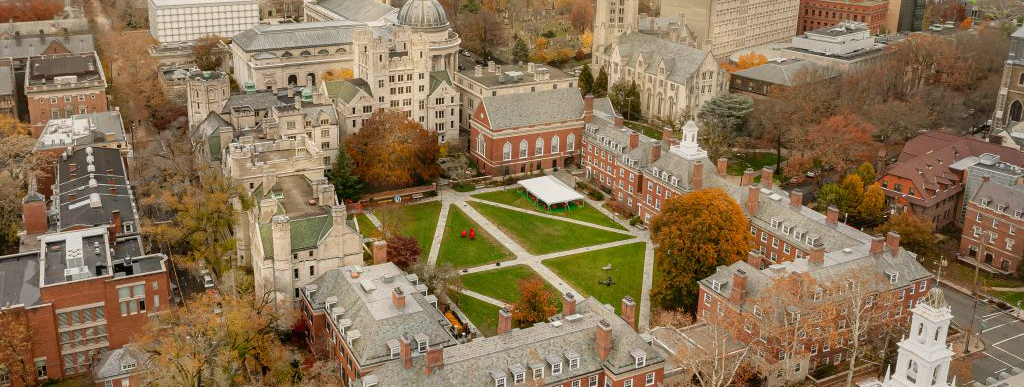With contributions by IvyWise counselors Tasha and Chris
The growing cost of college combined with the increasing demand for students in career-ready fields such as engineering, finance, computer science, and medicine leaves many people challenging the liberal arts. Much of the conversation surrounding higher education is focused on value and ROI. What majors earn the most right out of college? Which institutions produce graduates with the highest salaries? When deciding how to choose a major, you may find yourself asking: Is a liberal arts education still relevant in the 21st century?
In short: Yes. With millennials averaging five to seven career changes in a lifetime, one could argue that liberal arts degrees may be more valuable than ever before. In fact, a 2023 survey conducted by the American Association of Colleges and Universities found that the majority of employers nationwide value the broad knowledge and skills of liberal arts graduates, viewing these skills as essential for career success.
What Is a Liberal Arts Education?
What exactly are the liberal arts? First, it’s important to note that curriculums of this kind were originally known as the liberal arts and sciences, and liberal arts colleges (LACs) offer incredibly strong and diverse STEM programs. Advocates of this educational path believe in exposure to a broad range (hence the “liberal”) of ideas, opinions, philosophies, and beliefs across the humanities, sciences, and social sciences.
Liberal arts colleges in the U.S. tend to offer majors and programs in more traditional academic subjects rather than pre-professional preparation — think economics instead of business. However, liberal arts graduates have many skills that employers are seeking.
LACs are not solely populated by devotees of Nietzsche and Socrates. Over the last 20 years or so, LACs have seen a huge shift on their campuses from a preponderance of humanities students to a majority of students majoring in the sciences and social sciences. Admission officers at LACs are more likely to be on the lookout for students with genuine and demonstrated interests in literature and philosophy than for biology majors who want to go to medical school.
Why Consider a Liberal Arts Education?
There are about 200 LACs in the U.S., and virtually every large university offers a college of liberal arts as well. Even Harvard, a paragon of higher education, boasts of “a liberal arts and sciences college nestled within a world-class research university.” But standalone LACs have some specific characteristics that define them and the experience they offer.
- They focus on undergraduate education and often do not have a graduate school.
- The faculty focuses on teaching first and research second — the opposite of a large research university.
- All classes, including introductory levels and first-year seminar requirements, are taught by faculty. At large universities, these classes are often taught by graduate students whose main focus is their own degree program.
- The class size tends to be smaller and more discussion-based, and it is a point of pride to have a high percentage of classes with 20 or fewer students.
- LACs are primarily residential colleges for full-time students, with most living in campus housing, eating in campus dining halls, and directing their extracurricular and social energies toward campus activities, from activism to athletics, student government, and sustainability. This fosters a strong sense of campus community where students feel ownership of their school and offers myriad opportunities to engage in and develop leadership skills across a variety of campus organizations, cultivating personal as well as intellectual growth.
Art history professor T. Kitao of Swarthmore College delivered an address with a poignant summary of the value of a liberal education:
“The knowledge you learn about the subject of the course is its nominal benefit. It is like the stated moral at the end of a fable. The real substance of learning is something more subtle and complex and profound, which cannot be easily summarized — like the story itself. It has to be experienced, and it is as an experience that it becomes an integral part of the person. Learning how to learn by learning how to think makes a well-educated person.”
Academically, LACs offer surprising breadth to go with the depth of their majors. It is very common for students to augment their primary interest with a minor or two, or to double major — sometimes in disparate subjects like biology and theater, or in more closely aligned areas like political science and philosophy.
Are Liberal Arts a Good Fit for You?
Everyone can benefit from a liberal arts education, but many students find this path is the best fit for their goals and skills. Here are three types of students who should consider pursuing liberal arts majors.
1. You Like to Make Connections and You Go Down Rabbit Holes
Are you the kind of person who learns about something and then obsesses about it — going into a deep internet rabbit hole? Are you the kind of student who likes to make connections between subjects or new nuggets of knowledge? For example, a liberal arts student in a coastal geology course may become interested in the history of the people who used to live in the place they’re studying. This could lead to a deep dive on the indigenous language of those people and the way it connects to the geography of the place.
Sound interesting? This is exactly the kind of interdisciplinary thinking, exploration, and research that a liberal arts education encourages. Some liberal arts courses, especially discussion-based or more advanced courses, may feature very specific topics. For example, rather than take a general course on the history of Latin America, a liberal arts curriculum may offer a specialized course on the social history of Cuba between the Spanish-American war and the Cuban Revolution
2. You Have Many Interests and Are Undecided on Your Major
The liberal arts are generally a great path for students who are very undecided on what they want to major in. Typically, colleges that specialize in or prioritize the liberal arts allow students a ton of wiggle room and space for exploration, especially in their first two years.
For example, a student may take a general anthropology course and discover their interest in political science or journalism. A different student may take a biology course and discover their interest in environmental science and ecology. That said, liberal arts education may help undecided students narrow things down through extensive course catalogs and specific course offerings.
3. You Really Enjoy Reading and Writing
Though the liberal arts include the hard sciences and social sciences, there is a particular focus on the humanities. A liberal arts seminar might be in history, English, art history — you name it! These kinds of courses will be discussion-based, which means they will require quite a bit of reading. The discussions will be based on that reading and your written assignments will be based on those readings and those discussions. The quantity of written assignments will vary depending on the class, but in general, liberal arts curricula require quite a bit of writing.
Top Liberal Arts Colleges List by IvyWise
If you go to college in the U.S., chances are that you will be exposed to the liberal arts in some way — most colleges want you to acquire a well-rounded education. The question is whether you will seek out the liberal arts specifically, either by attending a liberal arts school or by enrolling in a program that focuses on the liberal arts, like the Boston University College of General Studies, for example.
Here’s how our list goes:
- Pomona College
- Harvey Mudd College
- Claremont McKenna College
- Swarthmore College
- Haverford College
See the full list of top liberal arts colleges selected by IvyWise counselors.
A Liberal Arts Degree in the 21st Century Job Market
Liberal arts colleges produce students with strong critical thinking skills who have the confidence and flexibility to continually learn new skills and material. In his book, “The World Is Flat: A Brief History of the Twenty-First Century,” Thomas Friedman states that “in an age when parts or all of many jobs are constantly going to be exposed to digitization, automation, and outsourcing… it is not only what you know but how you learn that will set you apart. Because what you know today will be out-of-date sooner than you think.”
Even if you are certain about a career path you want to pursue, a liberal arts background can help you make it to the top of your field. For example, a student who is certain they want to be a doctor could attend a liberal arts college pursuing a major in psychology and minor in economics before attending medical school. As a doctor, they could call upon their psychology degree to better understand and relate to their patients. The strong writing skills gained from their liberal arts background would help them to effectively communicate their research findings through publications. Their economics minor would help them to be successful if they decided to start and grow their own private practice.
While STEM majors tend to earn the highest salaries out of college and typically earn more overall, liberal arts degree holders are seeing a great ROI — it’s just not as immediate. Of course, you can always have the best of both worlds by attending colleges bridging liberal arts and STEM, but consider first if that option is a good fit for you.
Steve Jobs once said, “Technology alone is not enough. It’s technology married with the liberal arts, married with the humanities, that yields us the results that make our hearts sing.” It’s important to remember that, while there is a demand for STEM students and specialized degrees, it is possible to pursue a liberal arts education with intent and create multiple paths to career success in the process.
Apply to Liberal Arts Colleges with Expert Help
At IvyWise, we work with students interested in a variety of fields and majors, including those looking to narrow down their interests or pursue a more broad, liberal arts education. Our experienced counselors will help you identify the best-fit schools and courses of study for your interests and goals — no matter how specific or undefined. For more information on our college counseling services, contact us today.




